Commentary on Hebrews 9:17
Hebrews 9:17 states, "For a testament is of force after men are dead: otherwise it is of no strength at all while the testator liveth." This verse establishes a fundamental principle regarding the nature of a testament (or will) within the context of covenant theology, as well as the new covenant instituted by Christ. Below is a comprehensive analysis drawn from various public domain commentaries.
Introduction to the Context
The broader theme of Hebrews revolves around the superiority of Christ and His covenant over the old covenant established under Mosaic law. The context of Hebrews 9:17 lies in the transition from the sacrificial system of the Old Testament to the sacrificial death of Christ, which forms the basis for a new covenant.
Analysis of Key Terms
-
Testament:
The term "testament" refers to a legally binding document that takes effect after the death of the testator. In biblical terms, it signifies the covenant agreement between God and humanity, which is most poignantly seen in both the Old and New Testaments.
-
Testator:
The "testator" is the individual who makes the testament. In this verse, Jesus Christ is the ultimate Testator whose death activates the blessings of the new covenant.
Historical and Theological Perspective
Matthew Henry comments extensively on the nature of Christ's covenant and the necessity of His death as the fulfillment of divine promise. He argues that the testament's efficacy hinges upon the death of the testator; thus, it was essential for Christ to die to establish the new covenant. Without His sacrificial death, there would be no basis for the new agreement between God and humanity.
Albert Barnes points out that the phrase “of no strength at all” underscores the idea that a covenant cannot be applied while the testator is alive. This underscores the seriousness and permanence of the covenant established by Christ's sacrifice, contrasting sharply with the temporary sacrifices of the old covenant.
The Purpose of the New Covenant
The writer of Hebrews emphasizes the need for a new covenant due to the inadequacy of the old one, which relied on continual sacrifices that could never fully atone for sin. Adam Clarke elaborates on the idea that while the blood of animals under the old covenant provided a temporary covering for sin, it was the blood of Christ, shed upon His death, that secured eternal redemption (Hebrews 9:12).
Covenantal Implications for Believers
The implications of Hebrews 9:17 extend beyond mere legalities; they demonstrate God’s unconditional love and the depth of His commitment to humanity. The death of Christ signifies the ultimate sacrifice, granting believers direct access to God and the eternal inheritance promised through the new covenant.
The Assurance of Salvation
In examining the assurance connected to the new covenant, Matthew Henry emphasizes that believers can find comfort in the fact that their salvation is secure through Christ’s completed work. The efficacy of this testament provides a solid foundation for the believer’s faith and trust in God's promises.
The Call to Fidelity
Furthermore, there exists a reciprocal relationship between the believer and the testament established by Christ. Albert Barnes highlights that believers are called to live in accordance with the principles of this new covenant, remaining faithful to the commitments made through Christ's blood.
Conclusion
In conclusion, Hebrews 9:17 encapsulates a core theological truth about the consequences of Christ's death in relation to the establishment of the new covenant. The Old Testament sacrifices were never sufficient; rather, it is through Christ's sacrificial death that the new covenant comes into effect, offering true redemption and a relationship with God. As believers reflect on this profound truth, they are reminded of the cost of their salvation and the richness of the inheritance they have received through faith in Christ.
The insights from these commentaries serve as a reminder to pastors, students, and theologians to deeply engage with the covenantal themes of Scripture, challenging them to contemplate the implications of the new covenant in their lives and ministry.


